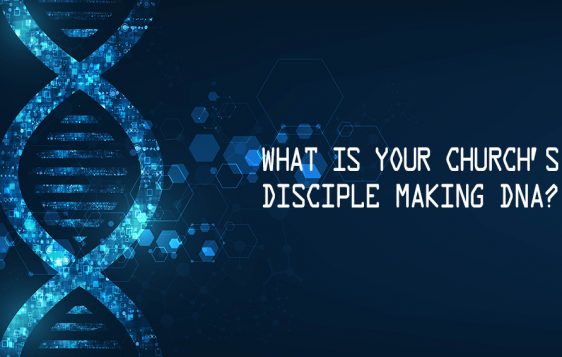Blog

DNA is defined as the combination of features that makes something what it is. It is what carries our genetic information, reproduces itself, and is the means by which hereditary characteristics pass from one generation to the next. This major component of chromosomes determines a person’s hair and eye color along with many other features.
We have all heard remarks like, “Wow, that apple didn’t fall very far from the tree” or “You could never deny that one” when a child looks a lot like one of its parents. In the same way, God’s children should resemble him!
Remember, anything healthy reproduces, so what will your church’s children and grandchildren look like? In Organic Leadership, Neal Cole defines the DNA of a church as Divine truth, Nurturing relationships, and Apostolic mission. This definition is simple, uncluttered, and powerful. It promotes and produces a mindset of an always expanding and multiplying ministry led by the Spirit of God.
DNA reminds us daily of our heritage and of what is most important to us. DNA determines who we are and who we are should determine what we do.
Even the tiniest of cells must exhibit DNA that is healthy and whole.
In the same way, a church will remain strong, healthy, and reproduce healthy children as long as its DNA is maintained. No matter what size a church is, it should have the Lord’s DNA because it belongs to him, it glorifies him, and it should look like Him.
Rick Warren said, “Church size never determines significance! No airplane pilot thinks 15 passengers are insignificant!” The question is, “What kind of disciple should we be producing if our church has the right kind of DNA?”
The lowest common denominator in the church is the disciple. The DNA of the church will be determined by the DNA of the disciples being produced.
What are the disciples in your church focused on the most?
What takes up most of their time?
How would your church describe a mature follower of Christ?
Every church and every follower of Christ is commanded to make disciples. That is supposed to be who we are and what we do, but is it? Fact: unless making disciples is in the DNA of your church, world evangelism is a fantasy.
Neal Cole goes on to say, “If your ministry is struggling without leaders, don’t reevaluate your leadership program. Reevaluate your disciple making system.” DNA becomes infected and mutant when churches become consumed with non-biblical traditions.mat These traditions do not contradict the Bible but neither are they mandated or necessarily mentioned in Scripture. Traditions include . . .
Singing “Happy Birthday” in the service
Sunday school
singing great hymns of the faith
the way we take an offering
the pastor being at every surgery
and many others . . .
Traditions can be good or bad. They become wrong and dangerous when they are elevated to being equal or sometimes even above Scripture. When this happens a church’s DNA is weakened and begins producing anemic disciples.
The church is busy with all kinds of activities and programs, but the time has come for churches to quit focusing on matters that the Bible is silent on and begin obeying what God has clearly commanded: making disciples. Don’t allow “good things” to become the enemy of what is best.
Spiritual maturity is not how much we know but what we are doing with what we know.
The real issue is not where your church meets but how it operates. The New Testament norm for every believer and every church is to multiply. J. D. Payne says it this way: “A healthy ecclesiology advocates that your church is to grow and multiply itself throughout the world.” Every disciple is responsible for his spiritual walk and every disciple is responsible to make disciples.
Where does it begin? By having the DNA of the number one disciple maker who ever existed: Jesus!
Copyright© 2020 @ healthychurchpodcast.com. Used with permission. No part of this article may be reproduced or reprinted without permission in writing from Lifeword.org.

